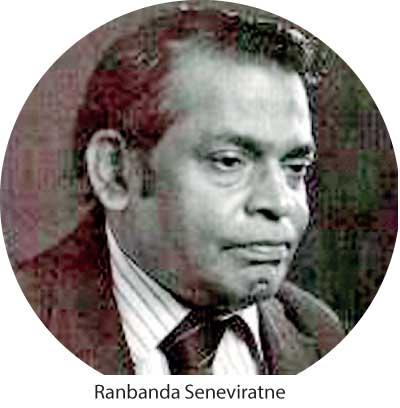Reply To:
Name - Reply Comment
Solution is to hit the problem in the face
women’s movement in Sri Lanka has been largely one still coping with and moderately reforming the structural anomalies in the system

But then Ranbanda also wrote “Oba Gedara Enna,” which evokes sympathy for a married woman in a very different way: by emphasising how the belaboured wife, waiting for her husband, doesn’t at all care about what that husband (a womaniser, it is strongly implied) has done, and promises to prepare food for and tend to him when he returns home every night. It’s more searing than ‘Landune’ because she knows the true character of her husband (as we do) yet “will not ask where you went”; moreover, if in that other song the woman has been wronged by the public in the open, here the tragedy is taken into the private, domestic sphere.
Ratna Sri Wijesinghe once argued that the latter work “would not cut much ice with feminists.” At one level, I think he has a point. “Oba Gedara Enna” is not about an empowered woman or a woman who seeks empowerment. Like the protagonists of Sumitra Peries’ films, she exists, suffers, and exists to suffer: there is a turning away from her plight. But in the context of the time in which it was written – when feminism in the West had entered its third wave, but was yet to made inroads here – it was daring. And here I think Wijesinghe was wrong: it has a relevance that is at once contextual, and timeless. It reverberated then, and it reverberates now.
"Women who break the glass ceiling, by a miracle, are celebrated by the same media that denigrates them whenever they venture out of their prescribed zones"
Then as now, women in Sri Lanka continue to make giant strides – limited to a certain milieu, but occasionally, as Parami Wasanthi and Tharjini Sivalingam have shown, emerging from other backgrounds – in every field. But these giant strides, exceptional as they are and hyped by the media, hide certain unpalatable realities. For instance, while more than 57% of females in the public sector are professionally-qualified, they make up only 45% of the workforce. The picture is more disconcerting when it comes to national statistics: women comprise around 56% of the population, yet only 33.4% of them are economically active, leaving nearly 70% inactive.
What these numbers make clear is the systemic marginalisation of a segment of the population that (quoting another figure) makes up almost 65% of the professionally-qualified. The woman has been, and continues to be, relegated to the household; when she gains employment she has to play a dual role: employee and wife.
We are hypocrites. Women who break the glass ceiling, by a miracle, are celebrated by the same media that denigrates them whenever they venture out of their prescribed zones (I recall that obnoxious incident where a soprano’s voice was compared to the screeches of a dying cat); they are held up as “beacons of hope” in the same corporate sector that escapes scot-free whenever a woman who has been groped, threatened or assaulted goes unheard to a point where she, not her boss, has to leave the workplace (entering a world of insecurity); their  capacity for agency and autonomy is ignored in an education system in which sex education never goes beyond the identification of reproductive organs and memorisation of their functions.
capacity for agency and autonomy is ignored in an education system in which sex education never goes beyond the identification of reproductive organs and memorisation of their functions.
In that sense, the women’s movement in Sri Lanka has been largely one still coping with and moderately reforming the structural anomalies in the system. For all their faults, Western countries – which incidentally embedded this system in countries like ours through colonialism – progressed not because they put mechanisms in place that shielded women in the household and office, but because women’s rights went beyond what we were tackling here: equality in employment, protection from marital rape and so forth. The fight for empowerment does not end in that sort of equality; it extends to other more complex issues. What we need, consequently, is a feminist narrative that goes beyond the usual, male-centric criteria of achievement.
It is my contention that Sri Lanka, sadly, is not yet ready to go beyond. We realise that there is a problem, and we have all come up with reasons for it: colonialism, religious conservatism, nationalism underscored by the image of the female as being fit for the household and kitchen (“a woman’s place”), and an education system that promotes ignorance of sexual matters on the one hand and promotes, by inaction, the culture of misogyny that’s rampant among schoolboys on the other. We are ready to indict these causes, to write essays on them, to come up with statistics as proof of the culture of toxic masculinity in the country. That is not enough.
We live in a country where we know what we do to our women is wrong even if it’s not illegal. We know that something as simple as wolf-whistling or flirting can evolve into something insidious. We know that referring to girls with derogatory epithets is disgusting. We know this, and many of us, when we grow up and become activists (or social justice warriors), take up the cause of women. But the subsection to which “we” belong is either a minority, or if it is not, is not willing to intrude on the root causes on which the issues it is combating rest.
Here I am not trivialising or marginalising the many people who put up a fight. I am criticising the inability of a great many of those many men who are not ready to take the narrative forward, since taking it forward would mean questioning the structures that gave rise to their cause. This has been buttressed by another issue: the movement for women’s rights, though representative of the country, has been largely limited to a specific milieu. These problems continue to eat away at our feminist movement, and it has undone the achievements we’ve clinched there.
To be fair, the second problem has been more or less solved. It’s been more than 40 years since Kumari Jayawardena observed that “all women do not as a whole belong to a separate homogeneous class,” and that they are not subject to the same forms of exploitation and oppression. Even if we have failed to grasp it, and concentrate the movement in the middle-class, we have come to terms with the fact that feminism in a country like ours cannot progress without accounting for the many sections of the community that exist and flourish with each other.
But even if we have – and this won’t happen for a long time – completely come to terms with this fact, we continue to look into equality of opportunity and protection from marital rape as the ultimate, only valid criteria of female empowerment, without delving into the underlying causes of such problems. We are cautious about elephants in the room: the culture of conformity that marginalises those who think differently in the classroom; the hooting and the wolf-whistling that have been normalised in gender differentiated schools; and the objectification of women as pieces (“kali”) and things (“badu”) that’s part of the schoolboy argot. 
Again, people realise the ramifications of not addressing these issues. A survey I recently conducted unearthed an interesting anomaly. The results were, on the whole, rather characteristic and to be expected: a vast majority (88%) think that using those aforementioned demeaning epithets is unacceptable, though a significant percentage (41%) have used them, with a slightly smaller yet as significant percentage (32%) having tossed them around; it should be added here that more than two-thirds of the respondents were schoolboys around the ages of 17 and 18.
And yet, surprisingly, many of them believe that this is not necessarily a reason for us to regulate the way(s) in which female objectification emerges in the classroom. They realise it’s wrong, that it is not acceptable, and they have done it, but they don’t think it’s really bad; in fact they do not believe that the school culture we have at present, even if it does perpetuate such a culture, should be faulted for what it is and what it does. One person even suggested that such terms are normal when used jokingly, or justifiable when describing a schoolgirl “who has multiple guys.”
It is for these reasons that I don’t think we have really improved. We have improved from the time that Ranbanda wrote his song about the oppressed wife, when the West had progressed into the third wave of feminism and feminism was making its way to the country. But that is hardly a reason for complacency.
What’s the solution, then? The solution is to hit the problem in the face. It comes with a hashtag, ladies and gentlemen. #MeTooSL.